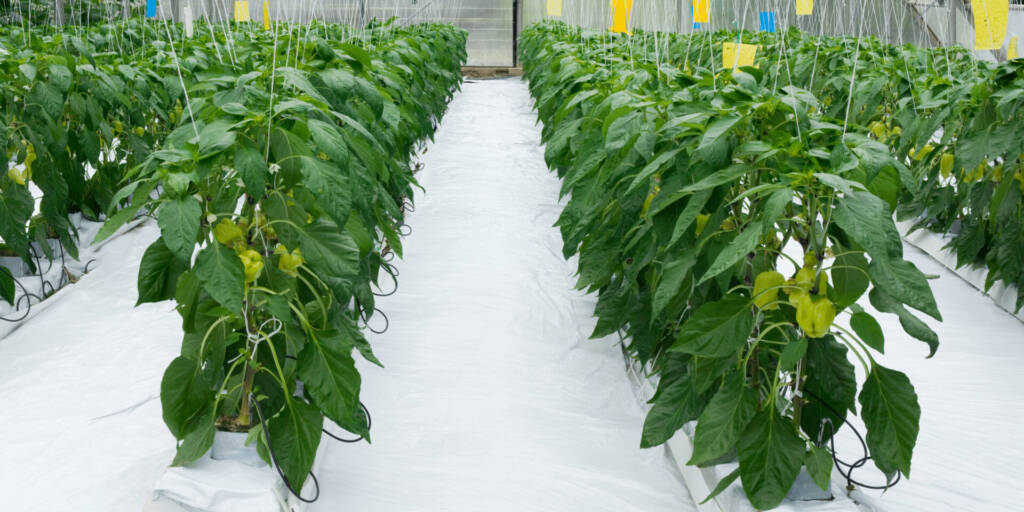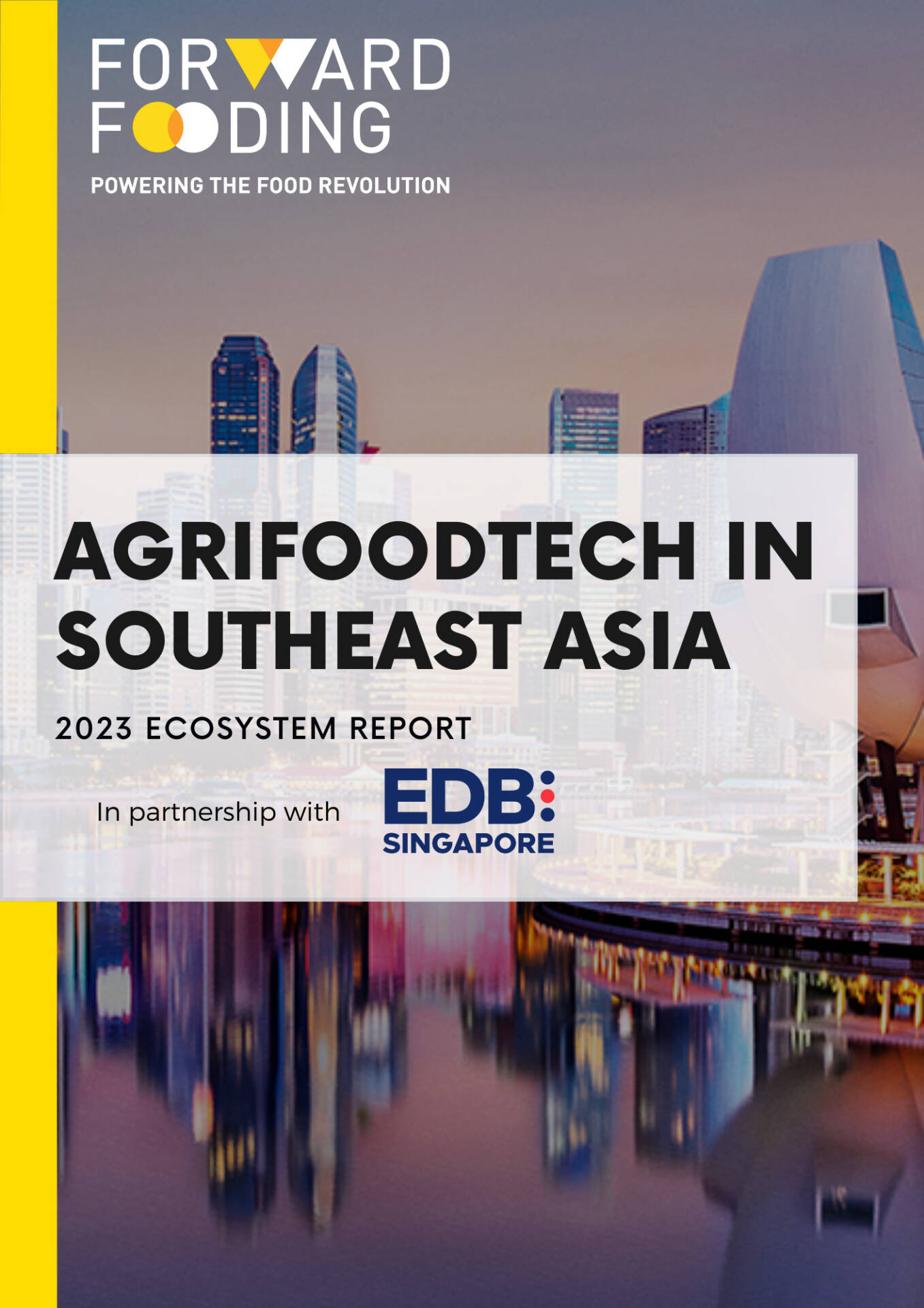FORWARD FOODING
THE BLOG
Unlocking the Potential of Plant Molecular Farming

What if we could grow a gram of pure protein extract inside a plant? Molecular farming proposes to do just that.
Plant molecular farming (PMF) is an application of biotechnology that traditionally involves using genetically modified plants to produce useful products such as pharmaceuticals, industrial enzymes and vaccines. Genetically modified plants are used as “bioreactors” to produce the desired products, which can then be harvested and purified for use. Recently, the sector started to make headlines as a few companies gained prominence for their use of this technology in the food industry.
How is Plant Molecular Farming different from other alternative protein production methods?
Plant Molecular Farming is a new frontier in the pursuit of sustainable protein production. But what sets it apart from other alternative protein production methods? As noted in this Sifted article, PMF shares many similarities with precision fermentation, both centering around the idea of genetically instructing organisms to produce molecules they wouldn’t naturally create. The key difference between these two technologies lies in the environment in which the organisms grow to synthesize the target molecules: precision fermentation uses bioreactors, while PMF utilizes plants, and can be grown like any other crop.

What can be made with Plant Molecular Farming?
As we mentioned before, PMF technology can be used to produce animal-free proteins, but that isn’t all it can do. This technology can be used to produce a wide variety of proteins and ingredients sustainably.
PMF has been around for several decades, gaining popularity due to its cost-effectiveness, scalability, and flexible output. It was first used in the late 1980s for producing pharmaceutical products such as pharma-related proteins, antibodies, therapeutics and vaccines. Later, it began to be used to make industrial enzymes. More importantly, over the past 20 years, this technology has made huge leaps forward.
Recently, PMF technology has made its mark in the food industry, showcasing its potential for alternative protein production. Companies have recognized this potential and are exploring the synthesis of alternative proteins such as dairy, cheese-making enzymes, animal proteins like the famous heme (precision fermentation-based heme was recently at the center of a heated legal battle between Impossible Food and Motif), egg protein, structural proteins like collagen, and growth factors for cell-based meat. Beyond proteins, PMF can be used to produce pigments for the food and health industries, dyes, bio-pesticides, fats, and metabolites. Although only a few companies currently operate in this field, we expect more to emerge and leverage PMF to produce a whole range of products and ingredients for the food industry.
Plant Molecular Farming methods
Currently, there are five methods for producing protein using Plant Precision Fermentation. These methods use a limited number of model plants and crops including safflower, soybean, tobacco, lettuce, pea, rice, barley, Camelina, and Nicotiana benthamiana. Let’s see them up close (alert – highly-scientific terms ahead!):
- Genetically modified plants (GMO) created through a process called “stable nuclear transformation” – This technique is used to introduce new genetic material into the plant cell’s nucleus, which is then incorporated into the plant’s DNA. The changes made are “stable”, which means they passed down to subsequent generations of the plant;
- Trans-plastomic plants created through a process called “stable plastid (or chloroplast) transformation” – Plastids are organelles (little organized structures) within a plant’s living cell which, like the nucleus, contain DNA. The stable plastid transformation process involves the introduction of new genetic material into the plastid of a crop species (instead of its nucleus). Like above, the changes made are stable and therefore are passed down to new generations. Some biotechnologists prefer this method over nuclear transformation as it helps to sidestep a series of complex technical problems;
- Transient transformation – Through transient transformation a foreign gene is introduced into the plant but it’s not integrated into the plant’s genome in a stable manner. This process is often use to test whether the gene functions as desired before making permanent changes to the plant’s genome;
- Virus-mediated expression of proteins in non-GMO plants – In this process, a virus is used as a vector to introduce a foreign gene into the plant’s cells and express the protein encoded by the gene. This technique allows the production of a desired protein in non-GMO plants without the need for stable genetic modification;
- Plant cell and/or tissue culture to express and secrete proteins into medium and recovered – In this process plant cells or tissues are grown in a controlled environment (such as a laboratory) in a nutrient-rich medium. The foreign gene encoding the desired protein is introduced into the plant cells/tissues and the protein is secreted into the medium. The protein is then recovered for further use. This technique allows for large-scale production of proteins and is commonly used in the production of biopharmaceuticals and other industrial products.
Who’s involved in the space and how?
As we said previously, PMF is not a new technology. However, with the recent focus on alternative proteins, researchers are turning to PMF to facilitate the production of animal-free proteins, food ingredients, pigments, natural dyes, etc. Although the use of PMF in the food industry is still in its early stages (the FoodTech Data Navigator features less than 20 companies in this segment), this technology is already drawing significant attention and excitement. Some PMF startups have already made the headlines. Let’s learn more about these companies.
One of the most glaring examples of PMF startups creating buzz is Moolec. A spinoff of Argentinian crop productivity group Bioceres, the company is working on producing real animal proteins through PMF. Moolec was the first FoodTech startup to go public this year – and started trading on Nasdaq at a valuation of $504M. It’s worth noting, however, that this example cannot accurately represent the performance of the entire industry, as Moolec is the first PMF company to go public and does not have a market-ready product yet.

Source: Moolec Science
BioBetter is another company that attracted quite a lot of attention in the past, especially when it announced it would start producing growth factors for cultivated meat using tobacco plants. Growth factors are essential in the production of cultured meat because they stimulate cell development and differentiation. But currently available growth factors – gathered from livestock or made through fermentation – can be costly. Instead, the company claims its growth factor can make cell-ag meat drastically more accessible, reducing the cost of growth media from $50,000 – $500,000 per gram to only $1 per gram. In September 2022, the startup raised a $10M Series A to accelerate its growth and entry into the market.

Source: BioBetter
Leaft Foods is another exciting company focusing on a variation of molecular farming. Rather than genetically instructing crops to produce specific proteins or ingredients, the company found a way to extract a naturally-occurring protein called Rubisco from green leaf plants such as alfalfa, spinach, and kale. The company made the headlines in 2022 when it announced it had successfully developed its extraction technology and raised a $15M Series A to expand its R&D capacities further and build a global value chain.

Source: Leaft Foods
Nobell, a PMF startup focusing on dairy, came out of stealth mode in 2021 by raising a $75M Series B, which brought its total funding to $100M. The company set out to produce casein from GMO soy. The use of casein in animal-free cheese products allows these to retain the stretch and palatability of their traditional counterparts.

Source: Nobell Foods
PMF could change the food industry – opportunities and challenges
PMF has enormous potential to positively impact the food industry. Not only the alternative protein market but the traditional dairy industry as well. For example, Syngenta’s GMO corn Enogen, which accelerates the conversion of starch into glucose, is increasing the digestibility of dairy cattle feed and reducing methane emissions. In particular, Syngenta claims that using Enogen® corn for livestock feed in dairy operations, allows farm operations to achieve more than 1.4 million kg CO2e in greenhouse gas reduction per 1,000 dairy cows.
That said, Molecular farming also faces some challenges. Here is a recap of both sides of the token:
Advantages
- Cost-effectiveness: Using plants as bioreactors to produce enzymes and proteins could be more cost-effective than using transgenic animals, fermentation or bioreactors. This is because plants can be grown at a larger scale with existing infrastructure.
- Sustainability: PMF can mitigate the environmental impact of manufacturing certain products by avoiding the use of excessive energy and eliminating the emission of fossil fuel pollutants.
- Timeline: The time elapsed from gene expression to when the targeted protein is produced can be relatively short, ranging from four to eight weeks. It is even possible to achieve protein expression within five days post-introduction of target gene DNA sequence using specific PMF technologies. However, in comparison, the process of producing and filtering precision fermentation dairy proteins like whey and casein is said to take about two weeks.
- Plant Growth Infrastructure: Planting, harvesting & processing expertise and infrastructure are in place for most plant species routinely used in PMF. In addition, growth room and greenhouse space can be minimized by using vertical farming technology, thereby increasing the number of plants and biomass for enhanced target protein production.
- Safety and Contamination: It is well known that plants are free from human pathogens that could be a source of risk and contamination of the final protein or other products.
Challenges
- Environmental risks: The use of genetically modified plants in PMF could potentially result in potential environmental risks. One such risk is the spread of modified genes to wild plant populations, which could alter the genetic makeup of these populations and lead to unforeseen consequences. Another risk is the displacement of native species, which could disrupt ecosystems and lead to the loss of biodiversity. In many countries, regulations have been established for GMOs to ensure their safety for both human consumption and the environment
- Societal concerns: Some people may harbour concerns about the use of genetically modified organisms in agriculture and food production. In addition, there may be cultural or ethical objections to the use of plants as bioreactors to produce certain products. So far, consumer signals have been positive regarding their willingness to try biotech-derived products like cell-based meat and precision fermentation products.
- Plant overload: If too many genetic traits are added to the crop’s genetic code, it may simply collapse due to unsustainable biology.
- Protein Yield: Protein expression level achieved at lab scale is often not translatable to commercial scale. Achieving higher yields is a prerequisite to commercial success and application of PMF technology.
- Downstream Processing: refers to the stage of production that follows the initial expression of the targeted protein. In this case, the challenge is to purify the target protein from the other proteins present. This requires cutting-edge purification technology that is difficult to scale.
- Plant Host: Not all plants can be used as a host for expressing (producing) desired proteins – only a few plant species have been successfully used for this application so far. If a particular protein cannot be expressed at high levels in the available plant species, the yield of that protein will be low. This can make it difficult to obtain large quantities of the desired protein through PMF.
This article has been co-written by Dr. Balaji Vasudevan, AgroBioscience Chief Scientist at UM6P Ventures. Dr. Vasudevan is a globally recognized AgriFoodTech thought leader with over 20 years of agtech experience in industry and academia combined that earned his Ph.D. in Plant Biotechnology from Madurai Kamaraj University, India, has 17 refereed international publications in top plant science journals (e.g. Nature Communications, Nature Scientific Reports, Plant Cell, Plant Physiology, Plant Journal, MPMI etc.) and has 1 patent filed on “Plant Molecular Farming to Produce Animal Proteins in Plants.”
Do you want to learn more about the FoodTech sector? Access our Food Data Navigator HERE to discover all the companies mentioned in this article and gather trends and insights, or get in touch HERE for a tailored consultancy.
Follow us
Sponsored Articles
9 July 2025
Forward Fooding celebrates the selection of 12 pioneering startups for the inaugural pladis Accelerator Programme. From water lily popcorn to sugar-converting enzymes, these innovations represent the future of snacking, addressing obesity, sustainability, and personalized nutrition through cutting-edge food technology.
21 March 2025
Tim Ingmire, VP of Global Innovation & Technology at pladis, discusses how the snacking giant is supporting early-stage startups in foodtech, health, and sustainability through their accelerator program. Learn about their focus on personalized nutrition, functional foods, and future ingredients to bring innovative, delicious products to consumers worldwide.
8 February 2024
Future Food-Tech returns to San Francisco on March 21-22 Over 1,700 food-tech leaders, from CPG brands, retailers, ingredient providers, [...]
1 February 2023
The 4th edition of FoodTech 500 is taking off and we are excited to partner with NEOM for the third consecutive year to support the best international AgriFoodTech entrepreneurs.
10 February 2022
One of the elements we enjoy the most here at Forward Fooding about working with AgriFoodTech startups is being [...]






